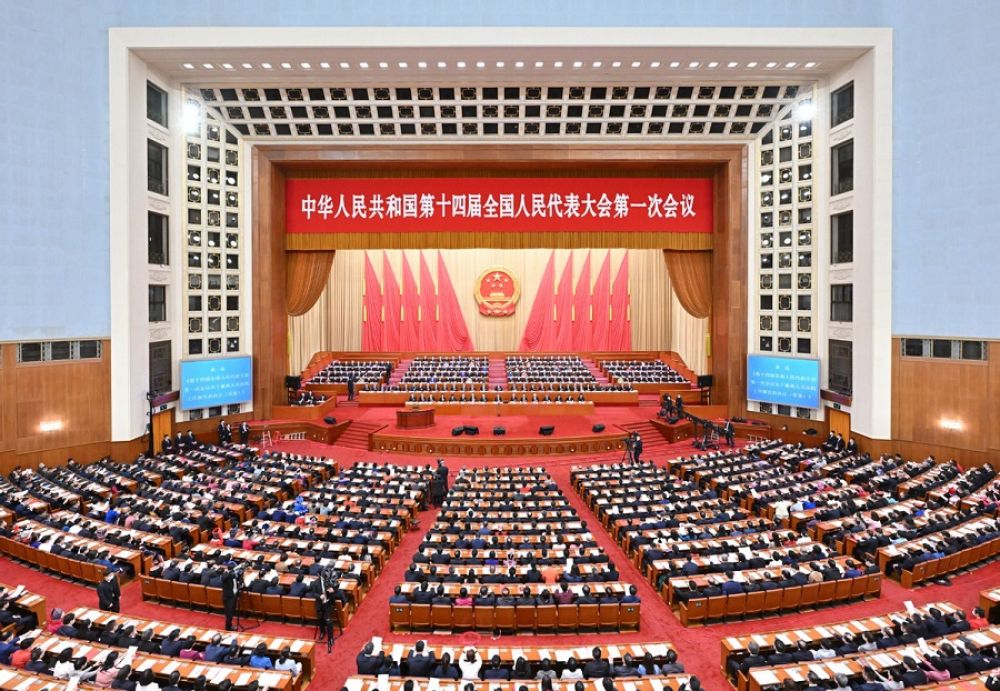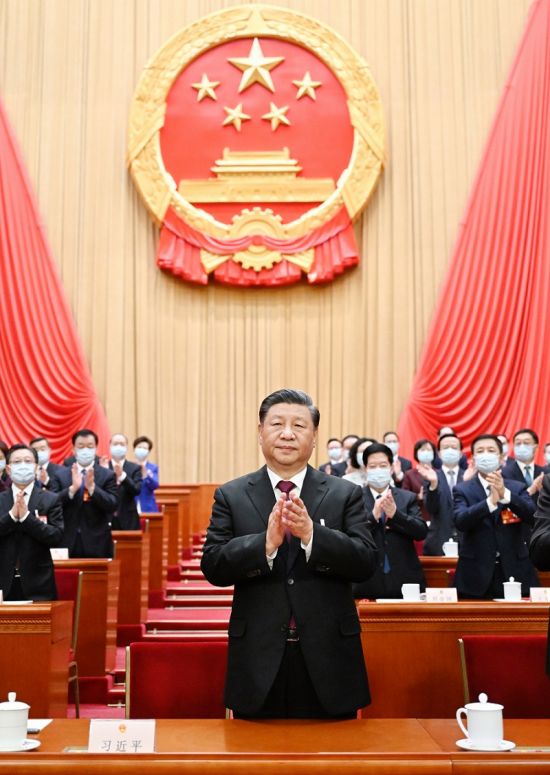At the recent National People’s Congress in Beijing, the government reorganized mechanisms for the regulation and oversight of the financial system, bringing these governing functions under tighter control of the Chinese Communist Party. Andrew Collier of Orient Capital Research in Hong Kong argues that this could be detrimental to China’s economic growth and financial stability.
Closing meeting of the National People’s Congress in Beijing, March 13: China has instituted the most significant changes to its economic and financial governing in decades (Credit: Xinhua)
China has made the most significant changes to its economic governing in several decades. Following the National People’s Congress (NPC), Beijing has placed power for the regulation and oversight of the financial system in the hands of a governing group in the Chinese Communist Party (CCP). While there can be advantages to centralized regulation, the likely outcome is politically driven, inefficient macroeconomic policy. This could negatively affect China’s growth and financial stability.
Several new policies stand out. One is to strip the People’s Bank of China (PBOC) of its local branches, along with the nine regional branches that had been established as a vague imitation of the United States Federal Reserve Bank. Instead, the PBOC will institute provincial branches under the direction of the provincial Party secretaries.
A second important change is to appoint the new vice premier, He Lifeng, to the position of Party secretary of the PBOC, putting him in charge of economic policy both in the government and at the central bank itself.
Additionally, the banking and insurance watchdog will be absorbed into a new bureau – a Central Financial Work Commission – to oversee all financial sectors except the securities industry. The PBOC will no longer have oversight of financial holding companies and financial consumer protection. The chief of staff of Chinese leader Xi Jinping, Ding Xuexiang, will become the commission head.
What is behind this centralization of economic policy and what should we expect in the future?
Xi has appointed trusted lieutenants with longstanding work experience with him to positions of power over economic policy. Ding Xuexiang has been Xi’s administrative assistant in a variety of roles including during Xi’s short stint as Party secretary in Shanghai in 2007 and later in the Central Committee’s general office. Ding does not have significant economic experience.
He Lifeng worked with Xi in Fujian (part of the so-called “Fujian Gang”) and moved to Beijing under Xi’s patronage. Although He has a PhD in economics, he is not known as a sophisticated policymaker but more as an efficient administrator. According to The Wall Street Journal, he pursued economic growth through aggressive state spending on urbanization and was known as “the big demolisher” for tearing down old buildings to make way for new developments. In this sense, he fits in with Xi’s state-led mindset.
Xi Jinping clearly has not been comfortable with the intellectual and political challenges that had been posed by senior officials such as economist Liu He, vice premier from 2018 till he stepped down at the NPC, and Li Keqiang, also an economist and premier from 2013 who was replaced by Li Qiang at the NPC. According to reports, both Liu He and Li Keqiang would disagree with Xi on policy.
The gradual shift to more “yes men” could have serious consequences on the direction of China’s economy. Was there a simmering conflict between the PBOC and the economic working group chaired by Xi Jinping? Or is this simply part of a larger concentration of power in Zhongnanhai?
Xi and the central bank appeared to have been on the same page with many economic policies. The deleveraging campaign was widely supported because it seemed to be commonly accepted that a collapse of the country’s property market – similar to the US financial crisis in 2008-9 – could result in a political crisis in China. Nonetheless, the severe impact of the three red lines policy on the property sector in 2020, which stripped the industry of its funding, may have convinced Xi that the PBOC’s tightening had gone too far and it was time to relax monetary policy.
Xi is eliminating the Federal Reserve-style nine PBOC regional offices in favor of 31 provincial offices. He is also closing the PBOC sub-branches. Beijing wants to create a local financial regulatory mechanism with officials dispatched by Beijing for oversight.
It is unclear what the problem was with these sub-branches. Were lending decisions “captured” by townships and cities? Certainly, several decades ago, then-premier Zhu Rongji made the crucial decision to make local PBOC officials report to headquarters in Beijing instead of to the local provincial Party head. From my meetings with local PBOC officials over the years, I was under the impression they were important as “feeders” of information to Beijing. Overall lending targets are set by the PBOC in Beijing and filtered through the state and regional banks and sub-branches. The banks have been the institutions responsible for reconciling centrally-dictated loan quotas with the demands from local governments – not the PBOC. So why the centralization?
The reduction of the PBOC’s branch network appears to be a political act to force the PBOC to respond to CCP demands. The danger is that, with fewer local branches and possibly more Party interference, the PBOC will have less understanding of local conditions and will be forced to respond to more top-down macroeconomic policies. In fact, it looks like the information flow, instead of bubbling up through the central bank’s channels with all of its economic expertise, will instead travel up and down through the political system of the CCP. That suggests that economic policy in future will be guided much more by their political than their economic impact. This makes sense – from the point of view of the Party’s central committee.
In addition, employees of the China Banking and Insurance Regulatory Commission (CBIRC) and the China Securities Regulatory Commission (CSRC) will be reclassified as civil servants. This lowers their salary but increases their chances for political promotions. It not only changes the incentives of regulators but also reduces the incentives of private-sector professionals to join the civil service as regulators.
Elsewhere, there are early signs of political intervention in bank policies. The CBIRC, which is going to be eliminated, recently told brokers not to provide bond quotes to certain trading screens due to concerns over data, according to Bloomberg and other news outlets. More worrisome, on March 15 the PBOC issued a statement saying it will “appropriately respond” to measures by the US and other countries to contain China, without specifying the actions. This sounded more like a political statement than a bank regulatory action.
Michael Pettis, professor of finance at Peking University’s Guanghua School of Management, has raised the challenging question of the effect of the centralization of economic power on China’s very high debt. The American economist Hyman Minsky, who died in 1996, postulated that excessive leverage is not simply a function of “irrational exuberance” of capitalism but is endemic to economic systems during boom times. He was an advocate of a strong central government to act as a corrective force to economies under balance-sheet stress, which China is facing now. So, there is an argument for a centralized bank system.
On the face of it, a country seeking to control its banks to reduce risk is a positive development. However, in the Chinese system, the centralization is occurring under China’s Communist Party – not its government. This increases the chances of politically-driven, inefficient, macroeconomic policy. In the 1990s China removed the PBOC from local politics by making the branches accountable to Beijing. Shifting these branches to a higher level of politics and increasing the role of the Party in financial is not helpful for the management of a stable economy.
Further reading:
Check out here for more research and analysis from Asian perspectives.


